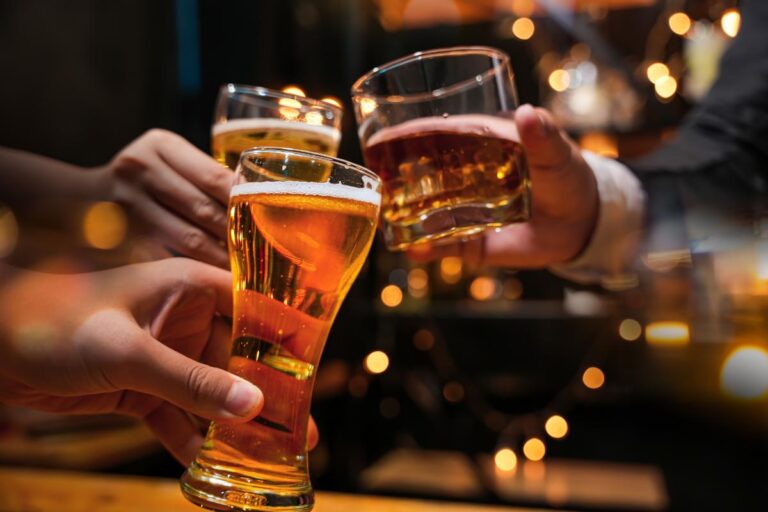We’ve all been there: waking up after a night of heavy drinking, feeling like death warmed over. The pounding headache, the nausea, the fatigue – hangovers are no joke. For years, we’ve been searching for that magic pill or potion to make it all go away. Well, folks, science might have finally cracked the code.
The Hangover Holy Grail?
A team of clever scientists, primarily from ETH Zürich, have developed something that sounds almost too good to be true – a hydrogel that could potentially prevent hangovers and reduce the harmful effects of alcohol. Now, before you get too excited, let’s break down what this means and how it works.
What’s This Miracle Gel?
This isn’t your average hangover cure. It’s a specially crafted hydrogel made from whey protein (yep, the same stuff you might use in your post-workout shake), iron atoms, sugar molecules, and tiny gold nanoparticles. Together, these ingredients create a powerful combo that breaks down alcohol in your digestive system before it even hits your bloodstream.
How Does It Work?
Here’s the science-y bit: When you drink alcohol, it usually gets absorbed into your bloodstream through your stomach and intestines. From there, it travels to your liver, where it’s broken down into acetaldehyde (a nasty toxin) and then into harmless acetic acid.
This new hydrogel throws a wrench in that process – in a good way. When you ingest it before drinking, it starts breaking down the alcohol in your gut, converting it directly into acetic acid. This means less alcohol gets into your blood, and you avoid that build-up of toxic acetaldehyde.
The Proof is in the… Mouse?
Now, I know what you’re thinking – “Sounds great, but does it actually work?” Well, the initial results are pretty promising, albeit in our furry friends. The researchers tested this gel on mice, and the results were impressive:
- Mice given the hydrogel had 40% lower blood alcohol levels after one hour compared to those who didn’t get the gel.
- After five hours, the difference was even more striking – 56% lower blood alcohol levels.
- The gel-fed mice were also much better at navigating mazes (I guess even mice have their own version of the “walk the line” test).
More Than Just a Hangover Cure
Here’s where it gets really interesting. This hydrogel doesn’t just potentially prevent hangovers – it could have some serious health benefits for heavy drinkers. In the study, mice that were chronic binge drinkers suffered liver damage, weight loss, and gut problems. But when these mice were given the gel along with their alcohol, they were almost entirely protected from these issues.
The key seems to be preventing the buildup of that nasty acetaldehyde we mentioned earlier. By stopping this toxin from accumulating, the gel appears to protect organs from alcohol-related damage.
When Can We Try It?
I know, I know – you’re probably wondering when you can get your hands on this miracle gel. Unfortunately, we’re not quite there yet. Professor Raffaele Mezzenga, one of the lead researchers, says they’re hoping to move to human clinical trials as soon as possible. But as with all medical research, it takes time to ensure it’s safe and effective for humans.
Related Stories
The Future of Drinking?
If this hydrogel proves to be as effective in humans as it is in mice, it could be a game-changer. Imagine being able to enjoy a night out without worrying about the next morning’s headache or the long-term health effects of drinking.
The researchers envision it being used in various ways:
- As a preventative measure before a night of social drinking (maybe even allowing you to drive home safely).
- In rehab facilities to help people struggling with alcohol addiction.
- In hospitals to help heavily intoxicated individuals sober up more quickly.
A Word of Caution
While this all sounds incredibly promising, it’s important to remember that this isn’t a free pass to drink irresponsibly. Alcohol abuse is a serious issue that claims millions of lives each year. This gel, if it proves effective in humans, could be a valuable tool in reducing alcohol-related harm, but it’s not a solution to alcohol addiction or a reason to increase your alcohol intake.
The Bottom Line
So, is this the hangover cure we’ve been waiting for? It’s too early to say for sure, but it’s certainly one of the most promising developments we’ve seen in a long time. As we eagerly await human trials, let’s raise a glass (of water, for now) to the possibility of hangover-free mornings in our future. Cheers to science!




Comments are closed.